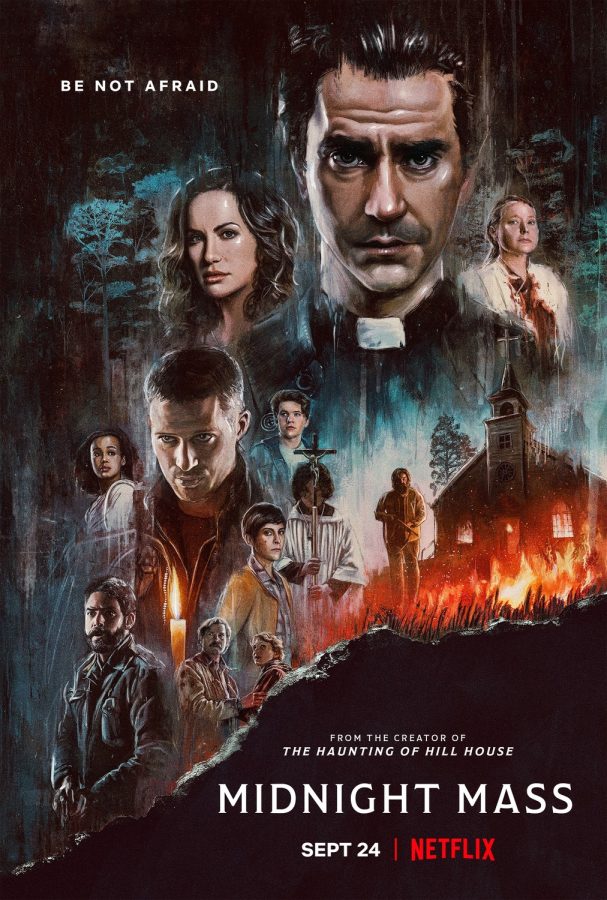Acclaimed horror director Mike Flanagan returns to Netflix for his third limited series, “Midnight Mass,” a religion-focused spectacle that delivers an excellent combination of powerful messages and stressful tension that it rides on to the last minutes.
Flanagan’s “Midnight Mass” is Netflix’s new seven-episode drama/horror/mystery/thriller limited series. Flanagan has found success on Netflix before with “The Haunting of Hill House” (2018), “The Haunting of Bly Manor” (2020) and “Gerald’s Game” (2017).
From the opening moments of the first episode, the show is wholly engrossing as it introduces us to the basic premise. “Midnight Mass” is set on the fictional Crockett Island where a small community of 127 people live, many of whom are fishermen. While ferries make daily trips to and from the mainland, the community is largely cut off from the outside world.
We are immediately introduced to one of the protagonists, Riley Flynn, who came back to the island after being imprisoned for several years because he killed someone in a drunk driving crash. But Riley isn’t the only character we follow; “Midnight Mass” has several main characters and jumps around to many different perspectives to get a holistic picture on the show’s well-developed characters.
The community on Crockett Island is very close-knit, and everyone has their own role. Many of the residents have lived their whole lives on the island and so it is all they know.
The show introduces early the plot’s centerpoint, Saint Patrick’s Church, that brings together the very Catholic community. While the entire community does not attend church, a portion find it’s an essential part of life on the island. Among them is Beverly Keane, a devoted Catholic who is the only character that is an obvious antagonist.
“Midnight Mass” slowly reveals its unique plot episode by episode, scene by scene, and it is not obvious until about halfway through the show what is actually happening. Even then, there are mysteries all the way up until the final episode, and I found myself dying to know what happened next.
One of the most central characters is Father Paul Hill, the pastor of Saint Patrick’s Church. Played by Hamish Linklater, Father Paul replaces Monsignor Pruitt, who was the island’s pastor for decades, but is said to be ill and temporarily on the mainland.
Father Paul quickly gains the trust of the community by showing his genuine care for the residents while preaching grand and memorable sermons. Linklater is perfectly cast for the role of Paul Hill and his acting is one of the best parts of the show. He is exceedingly mysterious yet indescribably charismatic, and I found myself eager to learn more about him.
The characters in “Midnight Mass” are both well written and well developed. With an exception or two, everyone has a clear motivation and meaningful backstory. Because of the small community, there is room for just about every character to stand out, including the side characters.
Hassan, the island’s sheriff, is a great example. Being a Muslim, Hassan was the odd one out and faced a lot of racism and general distrust from the community. His presence offers an important contrast to the faithful Christians who populate the island.
I appreciated how Hassan is not just a religious foil, but his antithetical way of thinking ends up having significant relevance to the core plot in several unique ways while also being presented responsibly. His perspective adds an important opposition to many of the characters’ hardwired Catholic mindsets.
There are a multitude of monologues and deep conversations scattered throughout the show, but each is handled with care and offers important and meaningful information. While this method of ‘telling’ rather than ‘showing’ is the opposite of one of the most important rules of storytelling, “Midnight Mass” operates as an exception to the rule.
The monologues seldom feel forced. One of my favorites revolves around a central message of the show: the value of religion to someone who is a believer and someone who is not. In this conversation, two characters answer the question, “What happens when you die?” Flanagan’s writing talent shines in these moments, and contrary to some of my experiences with dialogue-heavy shows in the past, I never got bored of listening to anyone speak their mind.
Midnight Mass shares several important messages about the dangers of blind faith and commentary on extreme Christianity. It is difficult to speak of these ideas exactly without giving away too much of the show, but apart from the high entertainment value that it offers, I felt as though I had learned quite a bit by the end.
In order to prevent Riley from having to go back to the mainland to attend his mandatory Alcoholics Anonymous meetings, Father Paul creates a new branch of the church devoted to just that. Riley, much to the dismay of his parents, lost his faith not long after his drunk driving incident and chooses to take up Paul on his offer, leading to weekly 1-on-1 conversations between the two.
Riley, haunted by the image of the girl he killed, challenges the notion that “God acts in mysterious ways,” and Father Paul counters back, challenging his lack of faith yet believing in him regardless. These conversations are tense and full of substance, and are just another example of the engrossing writing that the show offers.
The show’s tense atmosphere also allows for a number of genuine scares that are well distributed throughout. The jumpscares are not too over the top, but were just enough to get a genuine reaction out of me. They are particularly effective in the first half of the show when there is still plenty to be revealed about the plot and each major plot point is unexpected. I’m usually not a fan of jumpscares, but I found my opinion changed for this show. They were fluidly woven in with each having relevance to the plot, and even the ones that were expected still managed to get me, and I was happy they did.
I loved the feeling of watching “Midnight Mass.” It’s a show that keeps your full attention throughout, expertly unveiling twist after twist through the unnerving atmosphere while still managing to add plenty of well-deserved depth to the show’s interesting characters. It’s a wonderful experience from beginning to end and easily one of Flanagan’s best works.




